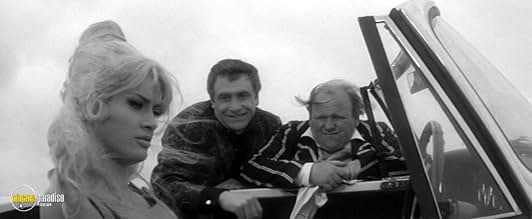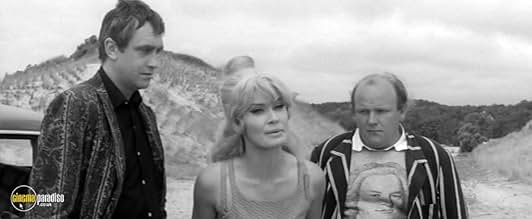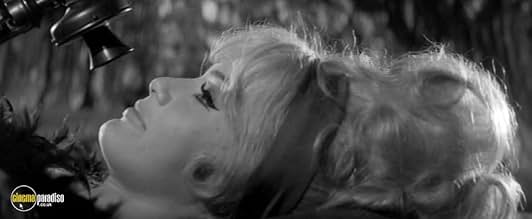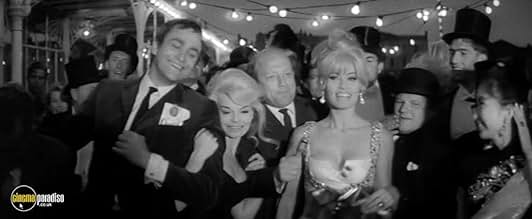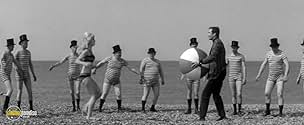Ajouter une intrigue dans votre langueA drab little English seaside town tries to improve its image--and increase its revenues--by holding a film festival. When a famous continental star agrees to attend, things get out of hand.A drab little English seaside town tries to improve its image--and increase its revenues--by holding a film festival. When a famous continental star agrees to attend, things get out of hand.A drab little English seaside town tries to improve its image--and increase its revenues--by holding a film festival. When a famous continental star agrees to attend, things get out of hand.
- Réalisation
- Scénario
- Casting principal
Jim Brady
- Film Festival Patron
- (non crédité)
Billy Dean
- Film Festival Patron
- (non crédité)
George Fisher
- Film Festival Patron
- (non crédité)
Claire Gordon
- Angelina
- (non crédité)
Juba Kennerley
- Film Festival Patron
- (non crédité)
Lucille Soong
- Starlet
- (non crédité)
Avis à la une
10eisor88
It's disappointing that this film is so little known, even among 60s British film buffs. (I was surprised that Robert Murphy was so dismissive of it.) I set my VCR to record this one (it was on at some ungodly hour in the middle of the night), and watched it the next evening. It was only on re-watching it that I realized that it was directed by Ken Russell, and this surprised me, since it didn't really strike me as his style at all.
I can't understand why one of your reviewers disliked it so much that they had to post two condemnations of it. I found it utterly charming. The comical Mayor, his strange Council, their French counterparts and the bath-chair oldies are just the background against which Jim and Judy's faltering romance plays itself out. I loved the bit where Judy roller-skates in slow motion at the fancy-dress party, and I love the way this is cleverly reprised (with lovely music) towards the end of the film, when Jim realizes his mistake in neglecting Judy and pursuing the sexy but flighty Francoise Fayol.
It's a comedy, but there are some very poignant moments in it. (The scene in the boat underneath the pier, for example.) There are some funny lines, as well (it's not all slapstick), and it's amazing how much incident Ken Russell manages to pack in, considering that this isn't a very long film. I'd love to have the music on CD, as well!
Like a lot of films of the early and mid 60's (I'm thinking of films like Darling, Georgy Girl and Alfie), French Dressing has quite an old fashioned moral in tow. Men lust after girls like Francoise Fayol, but they settle down with girls like Judy (if they're lucky, because she's got brains as well as being cute).
Jim isn't always very PC (well, I suppose it was forty years ago!), but it's obvious that he really loves Judy at the end. It's also quite touching how good a friend Henry (played by Roy Kinnear) is to both Jim and Judy.
I liked this film a lot, and I'd like to see it on the big screen. The next time they have a Russell retrospective, I hope they show it!
I can't understand why one of your reviewers disliked it so much that they had to post two condemnations of it. I found it utterly charming. The comical Mayor, his strange Council, their French counterparts and the bath-chair oldies are just the background against which Jim and Judy's faltering romance plays itself out. I loved the bit where Judy roller-skates in slow motion at the fancy-dress party, and I love the way this is cleverly reprised (with lovely music) towards the end of the film, when Jim realizes his mistake in neglecting Judy and pursuing the sexy but flighty Francoise Fayol.
It's a comedy, but there are some very poignant moments in it. (The scene in the boat underneath the pier, for example.) There are some funny lines, as well (it's not all slapstick), and it's amazing how much incident Ken Russell manages to pack in, considering that this isn't a very long film. I'd love to have the music on CD, as well!
Like a lot of films of the early and mid 60's (I'm thinking of films like Darling, Georgy Girl and Alfie), French Dressing has quite an old fashioned moral in tow. Men lust after girls like Francoise Fayol, but they settle down with girls like Judy (if they're lucky, because she's got brains as well as being cute).
Jim isn't always very PC (well, I suppose it was forty years ago!), but it's obvious that he really loves Judy at the end. It's also quite touching how good a friend Henry (played by Roy Kinnear) is to both Jim and Judy.
I liked this film a lot, and I'd like to see it on the big screen. The next time they have a Russell retrospective, I hope they show it!
Amusing 1960s innocence with Ken Russell twists. Experimental Hit and miss as with a many films and the arts at such a creative time.
This presumed comedy starts off reasonably well and has a few entertaining moments but they are few and far between.One can see the embryo talent of Ken Russell at work with lots of quirky moments.However one of the basic problems is the script.When you see numerous credited writers you know that there were problems with the film..Additionally the film has essentially non acting leading lady in Alita Naughton.It is little surprise that she had a very short acting career.Surprising that they couldn't get an experienced actress to play the part.In the acting stakes Marisa Nell is quite good at.buying her image.Roy Kinnear gives good support to leading actor James Booth.Associated British who released this film didn't have much luck with seaside comedies.The Punch and Judy Man wad also a box office disappointment for them despite the fact that it starred Tony Hancock.
What a heap of drivel. This early Ken Russell effort starts feebly then gets worse. It's a one-joke movie whose one joke isn't funny.
Jim is a cheeky young chap who works as a deckchair attendant for the council of Gormleigh, an imaginary holiday resort on the Kent Coast of England. Jim has a chubby friend called Henry and an American girlfriend, Judy. Judy is a cute kid who works as a journalist on the local paper, but wants to be a serious writer. Jim's brilliant idea is to galvanise tourist interest in Gormleigh by importing French sex-kitten actress, Francoise Fayol.
The single gag is the fun which arises (did I say fun?) when French sexiness meets English aldermanic pomposity. And there you have it.
Jim is played with barrow-boy chirpiness by James Booth, an actor very much in vogue at the time. The late, much-lamented Roy Kinnear is Henry, the dull and cowardly council employee who always seems to mess up. Alita Naughton makes her debut in this film, playing Judy. She is projected as the 'kooky' babe, an Audrey Hepburn for the beat generation. To the best of my knowledge, she was never heard of again.
"Dunno what you're laughing at," observes Henry at one point, and it might well be directed at the cinema audience. The humour seems to consist of getting people wet. We even have the old Walter Raleigh gag of spreading a cape over a puddle, then when the woman steps onto it she sinks up to her neck. And there is the platform of local worthies which slides into the sea. Yes, it's really as dire as that.
Merisa Mell (another starlet who didn't twinkle for long) plays Francoise Fayol. She pouts and wears bikinis. Because she is French, she says "Oh la la" quite a lot and breaks into "Gentille Alouette" when she's happy. Russell makes fun of the self-important Nouvelle Vague in 'Pavements of Boulogne', the film within a film, and Francoise's creator Vladek (Sandor Eles) seems to be a satirical thrust at Vadim.
Alita McNaughton is pretty, and Russell rather over-indulges the lingering close-ups during which she is expected to pull cute faces. She sings very nicely during her end-of-the-pier farewell to Jim and Henry, but she has little else to offer. She shows her stocking-tops twice (once, unaccountably, after removing a pair of jeans) - and it is twice too often for such a totally un-voluptuous woman.
The film falls between two stools. It fails as an old-fashioned seaside romp, and though one catches a whiff of rebellious sixties counter-culture ("What am I going to do with the flag?") it is too hidebound and middle-aged to work as a companion piece to "Hard Day's Night". Bryan Pringle was to spend the subsequent decade and more playing straight-faced comical weirdos, and he established the pattern in this film with his portrayal of the randy Mayor of Gormleigh.
Johnny Speight (whom I have always regarded as over-rated) provided additional dialogue, but whatever his contribution was, it didn't help. The 'big scene' - the riot in the cinema - is depressingly lame, in that oh-so-familiar British way.
Russell being Russell, there have to be some obtrusive auteurial camera tricks. We get bits of 'hip' sixties rapid-cut montage (the camel photos) and monotonous use of fast-motion for allegedly comic effect (Jim pedalling his bike hard, the Francoise disguise sequence, etc). Filming the boat conversation from another boat is, at least, visually interesting and in fairness to Russell the parting for France is attractively done, shifting the point of view between the pier and the ferry.
Robert Robinson appears as himself in what I can only assume was the consequence of a well-oiled Garrick Club wager.
Jim is a cheeky young chap who works as a deckchair attendant for the council of Gormleigh, an imaginary holiday resort on the Kent Coast of England. Jim has a chubby friend called Henry and an American girlfriend, Judy. Judy is a cute kid who works as a journalist on the local paper, but wants to be a serious writer. Jim's brilliant idea is to galvanise tourist interest in Gormleigh by importing French sex-kitten actress, Francoise Fayol.
The single gag is the fun which arises (did I say fun?) when French sexiness meets English aldermanic pomposity. And there you have it.
Jim is played with barrow-boy chirpiness by James Booth, an actor very much in vogue at the time. The late, much-lamented Roy Kinnear is Henry, the dull and cowardly council employee who always seems to mess up. Alita Naughton makes her debut in this film, playing Judy. She is projected as the 'kooky' babe, an Audrey Hepburn for the beat generation. To the best of my knowledge, she was never heard of again.
"Dunno what you're laughing at," observes Henry at one point, and it might well be directed at the cinema audience. The humour seems to consist of getting people wet. We even have the old Walter Raleigh gag of spreading a cape over a puddle, then when the woman steps onto it she sinks up to her neck. And there is the platform of local worthies which slides into the sea. Yes, it's really as dire as that.
Merisa Mell (another starlet who didn't twinkle for long) plays Francoise Fayol. She pouts and wears bikinis. Because she is French, she says "Oh la la" quite a lot and breaks into "Gentille Alouette" when she's happy. Russell makes fun of the self-important Nouvelle Vague in 'Pavements of Boulogne', the film within a film, and Francoise's creator Vladek (Sandor Eles) seems to be a satirical thrust at Vadim.
Alita McNaughton is pretty, and Russell rather over-indulges the lingering close-ups during which she is expected to pull cute faces. She sings very nicely during her end-of-the-pier farewell to Jim and Henry, but she has little else to offer. She shows her stocking-tops twice (once, unaccountably, after removing a pair of jeans) - and it is twice too often for such a totally un-voluptuous woman.
The film falls between two stools. It fails as an old-fashioned seaside romp, and though one catches a whiff of rebellious sixties counter-culture ("What am I going to do with the flag?") it is too hidebound and middle-aged to work as a companion piece to "Hard Day's Night". Bryan Pringle was to spend the subsequent decade and more playing straight-faced comical weirdos, and he established the pattern in this film with his portrayal of the randy Mayor of Gormleigh.
Johnny Speight (whom I have always regarded as over-rated) provided additional dialogue, but whatever his contribution was, it didn't help. The 'big scene' - the riot in the cinema - is depressingly lame, in that oh-so-familiar British way.
Russell being Russell, there have to be some obtrusive auteurial camera tricks. We get bits of 'hip' sixties rapid-cut montage (the camel photos) and monotonous use of fast-motion for allegedly comic effect (Jim pedalling his bike hard, the Francoise disguise sequence, etc). Filming the boat conversation from another boat is, at least, visually interesting and in fairness to Russell the parting for France is attractively done, shifting the point of view between the pier and the ferry.
Robert Robinson appears as himself in what I can only assume was the consequence of a well-oiled Garrick Club wager.
This is one of a dozen efforts I will be watching in tribute to its late controversial director, whose big-screen debut the film was. Actually, he started off his cinema career with two uncharacteristic movies (the second being the "Harry Palmer" adventure BILLION DOLLAR BRAIN {1967}): this one, then, is a farce which, at least, comes up with an original premise (a small British seaside resort contriving to augment its inexistent tourist industry by organizing a Film Festival and inviting a Brigitte Bardot-type siren to be the guest of honor) – even if, in retrospect, the general lack of discipline on display would soon become a mainstay in Russell's work, it is the would-be fashionable technique adopted throughout (a remnant of the "Swinging Sixties" fad just then taking sway) which dates it most of all! Having said that, the harsh cinematography (by the stalwart Ken Higgins) is very typical of its era – though the panned-and-scanned TV-sourced copy I watched did the film's look no favors at all!; in addition, Georges Delerue's score is pleasantly evocative.
As for the cast, it may be second-rate but proves undeniably enthusiastic: leading man James Booth seemed to divide his time between serious and lighter fare but nevertheless comes across as a bit forced here in the role of the deck-chair attendant who comes up with the idea for the much-needed economic boost (initially, the Mayor is almost offended that he should even deign him the time of day, let alone take heed of his suggestion!) – the town's notion of an event had earlier been restricted to a dismally-attended skating competition in fancy dress!; rotund Roy Kinnear is predictably buffoonish as the eager but gawky bureaucrat; Marisa Mell (replacing Annette Stroyberg, who withdrew due to illness) does well in the first of her only 2 films – the other being Basil Dearden's espionage romp MASQUERADE {1965} – made outside the "Euro-Cult" spectrum in which she later thrived; Alita Naughton, too, is a delight in her only theatrical film (she would drop off the radar completely in a couple of years' time!), bafflingly decked-out in sailor's outfit(!) as a teen journalist whom Booth 'plays' with but forsakes as soon as Mell turns up; Bryan Pringle, a prolific character actor here in something of a showcase as the lecherous Mayor (shown watching pornographic slides in his office!) and ingratiating himself with Mell at every turn; and Sandor Eles as Mell's agent who prides himself of having fabricated her alluring image but scoffs at the sex kitten's wish to flex her acting muscles.
The film's most notable set-pieces involve a parade disrupted when the pier from which both Mayor and starlet are watching slides out to sea, the Film Festival itself – highlighting the spoof of a French art-house pic – which turns into a melee' when some puritanical locals object to smut being projected (with people even ripping through the screen via the mouth of Mell's enlarged image!), and the concluding nudist beach inauguration (for which the journalist impetuously decides to replace the actress after the latter has left in disgust, with Kinnear making a desperate run to the train station in vain in order to retrieve her). For what it is worth, the comedy would like to hark back to the Slapstick heyday of the 1920s (with one rather nice nod to Laurel and Hardy) but the end result is decidedly patchy and, in any case, owes more to the vulgar "Carry On" brand then in full force!
As for the cast, it may be second-rate but proves undeniably enthusiastic: leading man James Booth seemed to divide his time between serious and lighter fare but nevertheless comes across as a bit forced here in the role of the deck-chair attendant who comes up with the idea for the much-needed economic boost (initially, the Mayor is almost offended that he should even deign him the time of day, let alone take heed of his suggestion!) – the town's notion of an event had earlier been restricted to a dismally-attended skating competition in fancy dress!; rotund Roy Kinnear is predictably buffoonish as the eager but gawky bureaucrat; Marisa Mell (replacing Annette Stroyberg, who withdrew due to illness) does well in the first of her only 2 films – the other being Basil Dearden's espionage romp MASQUERADE {1965} – made outside the "Euro-Cult" spectrum in which she later thrived; Alita Naughton, too, is a delight in her only theatrical film (she would drop off the radar completely in a couple of years' time!), bafflingly decked-out in sailor's outfit(!) as a teen journalist whom Booth 'plays' with but forsakes as soon as Mell turns up; Bryan Pringle, a prolific character actor here in something of a showcase as the lecherous Mayor (shown watching pornographic slides in his office!) and ingratiating himself with Mell at every turn; and Sandor Eles as Mell's agent who prides himself of having fabricated her alluring image but scoffs at the sex kitten's wish to flex her acting muscles.
The film's most notable set-pieces involve a parade disrupted when the pier from which both Mayor and starlet are watching slides out to sea, the Film Festival itself – highlighting the spoof of a French art-house pic – which turns into a melee' when some puritanical locals object to smut being projected (with people even ripping through the screen via the mouth of Mell's enlarged image!), and the concluding nudist beach inauguration (for which the journalist impetuously decides to replace the actress after the latter has left in disgust, with Kinnear making a desperate run to the train station in vain in order to retrieve her). For what it is worth, the comedy would like to hark back to the Slapstick heyday of the 1920s (with one rather nice nod to Laurel and Hardy) but the end result is decidedly patchy and, in any case, owes more to the vulgar "Carry On" brand then in full force!
Le saviez-vous
- AnecdotesA number of writers worked on the script, which was constantly being rewritten during the making of the film. When the TV presenter Robert Robinson agreed to play himself in a brief cameo, he told Ken Russell he would have to write his own lines as he wasn't an actor. Russell agreed and added that he could also rewrite everyone else's lines if he felt like it.
- Citations
Robert Robinson: Where will all of it end? Apache dancing in the Floral Halls? Absinthe in the ice-cream parlors?
- Versions alternativesIn the release print as owned and screened by the British Film Institute, the ending sequence titles are different from the Studiocanal owned prints (available on DVD) with no credit given to actress Germaine Delbat, while a dedicated message of acknowledgment to Michael Arthur Film Productions is shown on behalf of the producers.
- ConnexionsFeatured in Sunday Night: Don't Shoot the Composer (1966)
Meilleurs choix
Connectez-vous pour évaluer et suivre la liste de favoris afin de recevoir des recommandations personnalisées
- How long is French Dressing?Alimenté par Alexa
Détails
- Date de sortie
- Pays d’origine
- Langue
- Aussi connu sous le nom de
- Versuch's mal auf französisch
- Lieux de tournage
- Herne Bay, Kent, Angleterre, Royaume-Uni(Doubles as Gormleigh-on-Sea)
- Sociétés de production
- Voir plus de crédits d'entreprise sur IMDbPro
- Durée1 heure 26 minutes
- Couleur
- Mixage
- Rapport de forme
- 2.35 : 1
Contribuer à cette page
Suggérer une modification ou ajouter du contenu manquant

Lacune principale
By what name was French Dressing (1964) officially released in Canada in English?
Répondre
